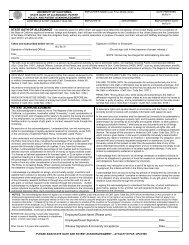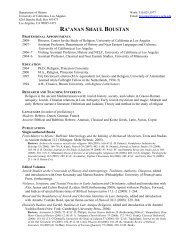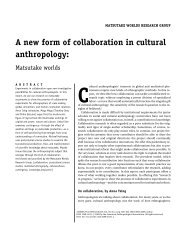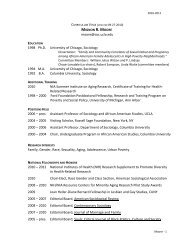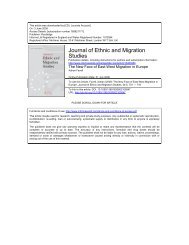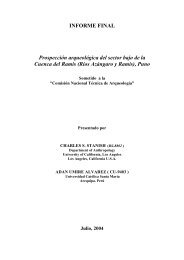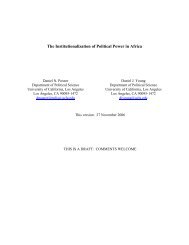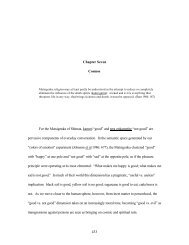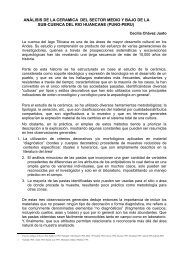The Long-Term Effects of Africa's Slave Trades - Social Sciences ...
The Long-Term Effects of Africa's Slave Trades - Social Sciences ...
The Long-Term Effects of Africa's Slave Trades - Social Sciences ...
Create successful ePaper yourself
Turn your PDF publications into a flip-book with our unique Google optimized e-Paper software.
causing current underdevelopment. I first reviewed the historical evidence<br />
on the characteristics <strong>of</strong> African societies that were most affected by the slave<br />
trades. <strong>The</strong> qualitative and quantitative evidence show that it was actually<br />
the most developed parts <strong>of</strong> Africa, not the least developed, that tended to<br />
select into the slave trades. I also used instrumental variables to estimate<br />
the causal effect <strong>of</strong> the slave trades on subsequent economic development.<br />
<strong>The</strong> main instruments I used were the sailing and overland distances from<br />
each country to the closest locations <strong>of</strong> demand in each <strong>of</strong> the four slave<br />
trades. Like the OLS estimates, the IV estimates are negative, suggesting<br />
that increased extraction during the slave trades caused worse subsequent<br />
economic performance. As a final strategy, I controlled for observable country<br />
characteristics. <strong>The</strong>se results also confirm that the slave trades had a<br />
causal impact on subsequent economic development.<br />
I then examined the precise channel <strong>of</strong> causality underlying the relationship<br />
between slave exports and subsequent economic development. Using<br />
historical evidence as a guide, I then examined whether slave exports resulted<br />
in a fragmentation and weakening <strong>of</strong> states, ethnic fractionalization,<br />
and a deterioration in the quality <strong>of</strong> judicial institutions. I found support<br />
for the view that the slave trades resulted in weak, politically fragmented<br />
states, ethnic fractionalization, and poor judicial institutions.<br />
A Deriving the Bias from the Under-Sampling <strong>of</strong><br />
<strong>Slave</strong>s from the Interior<br />
I show here that the non-classical measurement error present in the slave<br />
export data will result in OLS estimates <strong>of</strong> the effect <strong>of</strong> slave exports on<br />
income that are biased towards zero.<br />
To see this, denote the true number <strong>of</strong> slaves taken from country i by<br />
s ∗ i , the observed number <strong>of</strong> slaves by s i, distance to the coast by d i , and<br />
economic development by y i . All variables are expressed as deviations from<br />
means. Assume the true relationship between the number <strong>of</strong> slaves exported<br />
and distance to the coast is given by<br />
s ∗ i = −αd i + ε i (2)<br />
where α > 0 and ε i is i.i.d. drawn from a normal distribution. <strong>The</strong> relationship<br />
between the observed number <strong>of</strong> slaves exported s i and the distance to<br />
the coast d i is given by<br />
s i = s ∗ i − γd i + ν i (3)<br />
41




